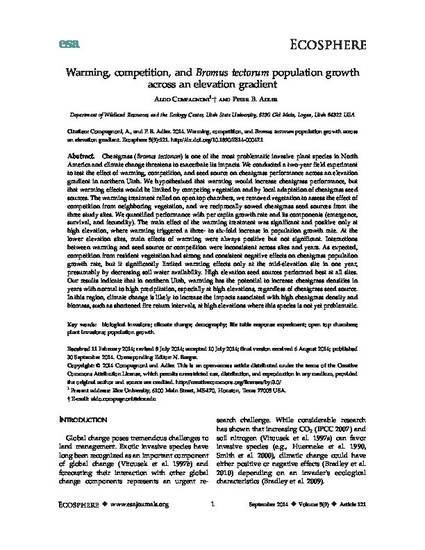
Article
Warming, competition, and Bromus tectorum population growth across an elevation gradient
Ecosphere
(2014)
Abstract
Cheatgrass (Bromus tectorum) is one of the most problematic invasive plant species in North America and climate change threatens to exacerbate its impacts. We conducted a two‐year field experiment to test the effect of warming, competition, and seed source on cheatgrass performance across an elevation gradient in northern Utah. We hypothesized that warming would increase cheatgrass performance, but that warming effects would be limited by competing vegetation and by local adaptation of cheatgrass seed sources. The warming treatment relied on open top chambers, we removed vegetation to assess the effect of competition from neighboring vegetation, and we reciprocally sowed cheatgrass seed sources from the three study sites. We quantified performance with per capita growth rate and its components (emergence, survival, and fecundity). The main effect of the warming treatment was significant and positive only at high elevation, where warming triggered a three‐ to six‐fold increase in population growth rate. At the lower elevation sites, main effects of warming were always positive but not significant. Interactions between warming and seed source or competition were inconsistent across sites and years. As expected, competition from resident vegetation had strong and consistent negative effects on cheatgrass population growth rate, but it significantly limited warming effects only at the mid‐elevation site in one year, presumably by decreasing soil water availability. High elevation seed sources performed best at all sites. Our results indicate that in northern Utah, warming has the potential to increase cheatgrass densities in years with normal to high precipitation, especially at high elevations, regardless of cheatgrass seed source. In this region, climate change is likely to increase the impacts associated with high cheatgrass density and biomass, such as shortened fire return intervals, at high elevations where this species is not yet problematic.
Disciplines
Publication Date
2014
DOI
https://doi.org/10.1890/ES14-00047.1
Citation Information
Peter B. Adler. "Warming, competition, and Bromus tectorum population growth across an elevation gradient" Ecosphere Vol. 5 Iss. 9 (2014) p. art.121 Available at: http://works.bepress.com/peter_adler/228/
